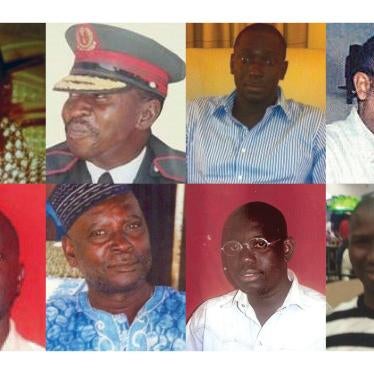
“Looking beyond Gambia’s beautiful beaches, the population lives in a climate of fear in which injustice prevails and accountability for abuses is beyond reach,” said Felicity Thompson, West Africa researcher at Human Rights Watch and author of the report. “The government needs to urgently turn things around by respecting basic rights and prosecuting those who violate them.”

State of Fear
Arbitrary Arrests, Torture, and Killing
Gambia’s National Intelligence Agency (NIA), a paramilitary group known as the “Jungulers,” and armed units of the Gambian Police Force have been most frequently implicated in the abuses, Human Rights Watch said. One former Junguler told Human Rights Watch: “When [Jammeh] wants to torture you, he uses the Jungulers team to torture you. Or if he wants to arrest you secretly, he uses this Jungulers team. Or when he wants to kill you without anyone finding out, they will just kill you and throw you [away].”
Several victims described torture methods that included severe beatings, rape, near suffocation with plastic bags, electroshock of body parts including genitals, and dripping melted plastic bags onto the skin. Victims also described psychological abuse such as prolonged periods in solitary confinement, mock execution, and repeated threats of torture and death. Most victims and witnesses who spoke to Human Rights Watch identified the Jungulers as responsible for the torture, but many reported that intelligence officials were present or complicit in the abuse.
Government oppression of the media has been particularly severe, apparently to silence criticism and suppress negative information about the country to the outside world. Dozens of journalists have fled Gambia in the last two decades. Most recently, the manager of the independent radio station Taranga FM, Alagie Abdoulie Ceesay, was detained in July. Ceesay was held incommunicado for 11 days without charge at NIA headquarters and severely tortured. A few days after his release, Ceesay was again detained, charged with several counts of sedition, and denied bail. He remains in detention.
Ceesay was “beaten until he fell unconscious and was forced to drink cooking oil like water on several occasions,” a person who saw him after his release from the NIA told Human Rights Watch. “We saw him, his face full of bruises and his back covered in marks and wounds. He could not walk properly because of the beatings.”
Gambians who identify as LGBT or who are perceived as such are regularly the target of Jammeh’s vitriolic hate speech, discriminatory new laws, and arbitrary detention and mistreatment. In May, Jammeh said at a rally that he would “slit the throats” of gay Gambians – the most recent slur in a long history of anti-gay hate speech. After passage of an “aggravated homosexuality” law in October 2014 imposing a life sentence for a series of new offenses, dozens of LGBT people fled the country.
One man who fled Gambia in 2015 after being acquitted of “unnatural acts” said he was repeatedly tortured while in NIA detention. “I was beaten with a club and fists,” he told Human Rights Watch. “They threatened me with death if I didn’t provide names of other homosexuals in Gambia.”
Despite the rampant human rights abuses in Gambia, authorities have conducted few investigations into allegations of torture or ill-treatment by state officials, and no government officials, security services personnel, or paramilitary groups have been held to account for serious violations.
In July, on the anniversary of the 1994 coup that brought him to power, Jammeh pardoned and released over 200 prisoners, including political prisoners and family members of those accused in the 2014 coup attempt. The release of unlawfully or arbitrarily detained prisoners is an important humanitarian gesture, but many more Gambians wrongfully remain behind bars.
International donors and other governments should consistently and publicly condemn human rights violations in Gambia, raise concerns with government officials at all levels, and press for accountability for abuses by state security forces, Human Rights Watch said.
“The recent releases of political prisoners will hopefully lead to further positive steps by the Gambian government, including disbanding the dreaded Jungulers, releasing the rest of those wrongly held, and prosecuting rights abusers in the security forces,” Thompson said. “So long as security forces and paramilitary groups act with impunity, Gambians will




Hi there to all, how is everything, I think every one is getting more from this website, and your views…
That is so true. Omg, you nailed it. That is exactly typical Gambian attitude unfortunately, it is very depressing.
Ba Buwa is a great man! I first heard his name when I was in Kiang Karantaba Primary School between…
[…] cuatro cuestiones que el comité no pudo resolver son las siguientes: canepa kanye Bubba (Bobby) Sangiang y Momodo Lamine…
Honestly, everything you said here was true and valid. He is obviously my inspiration and motivation. He is my Dad.